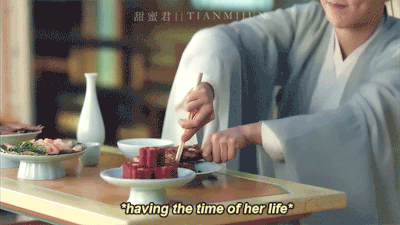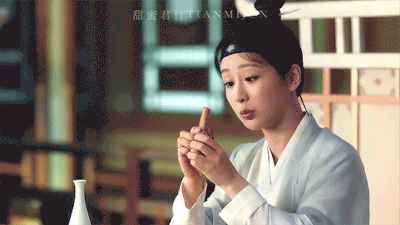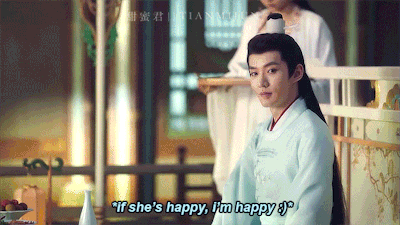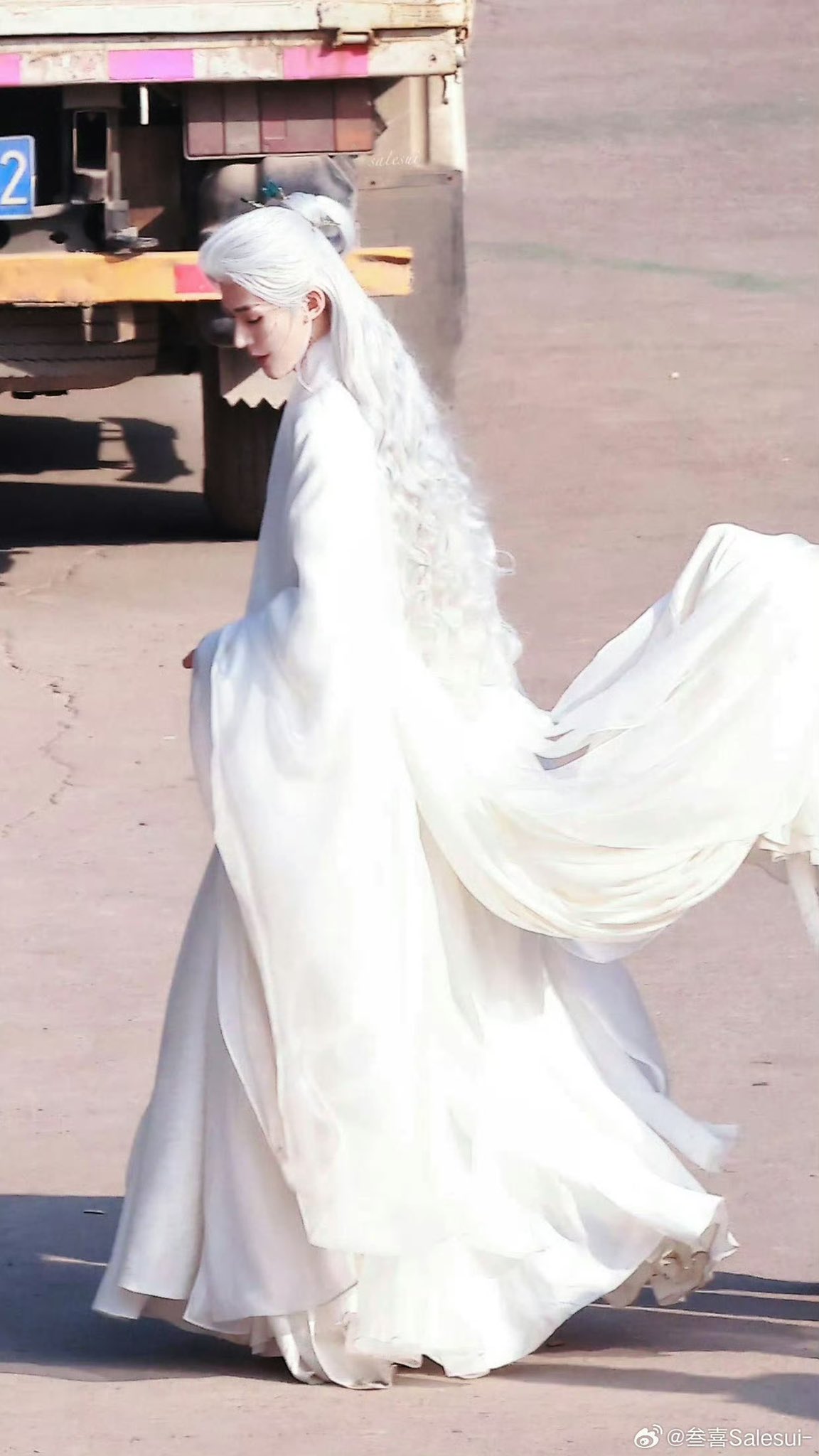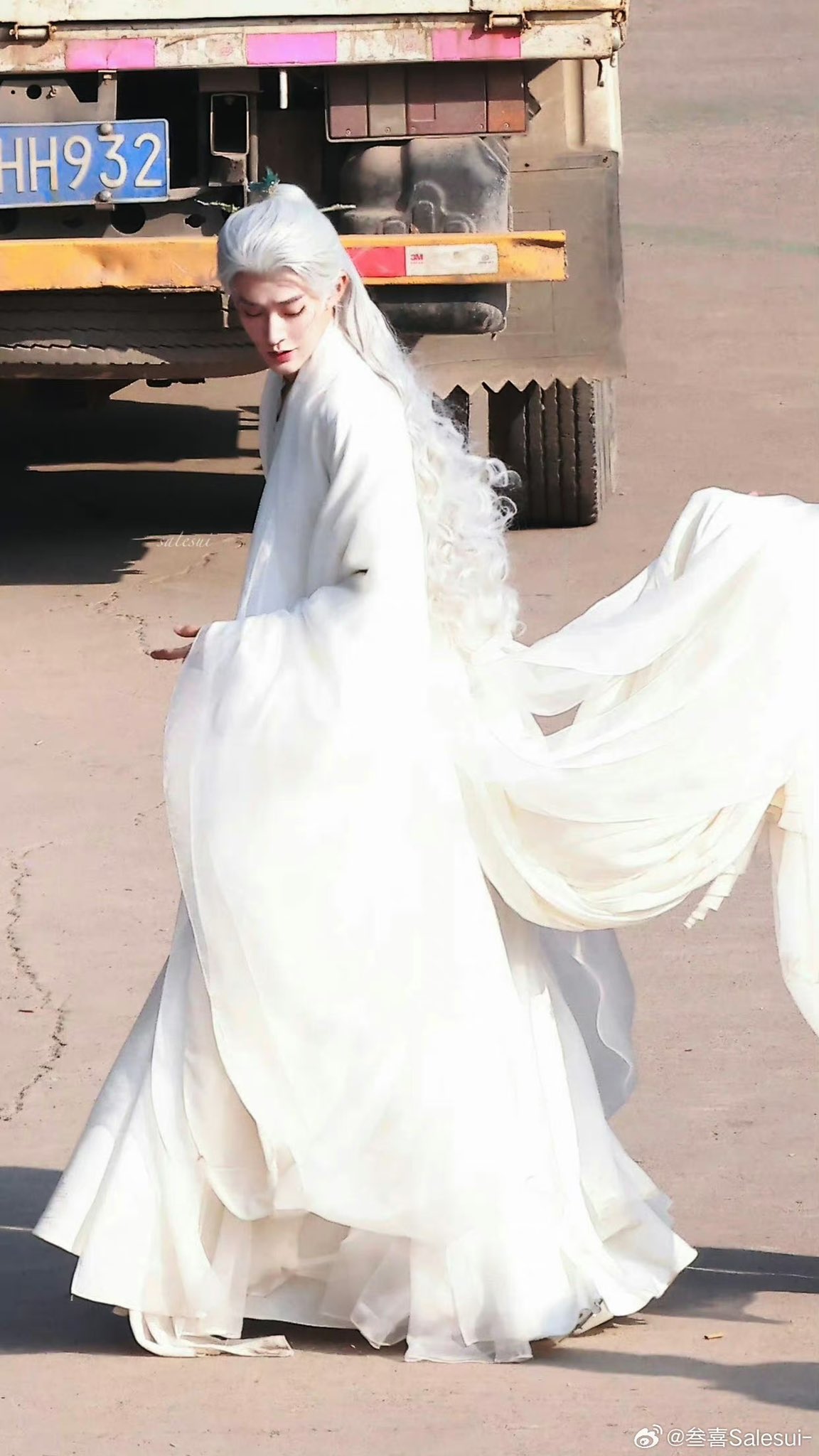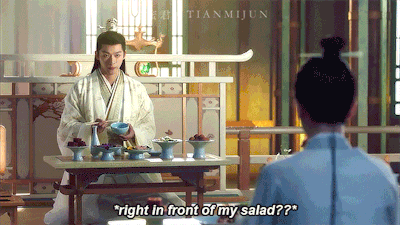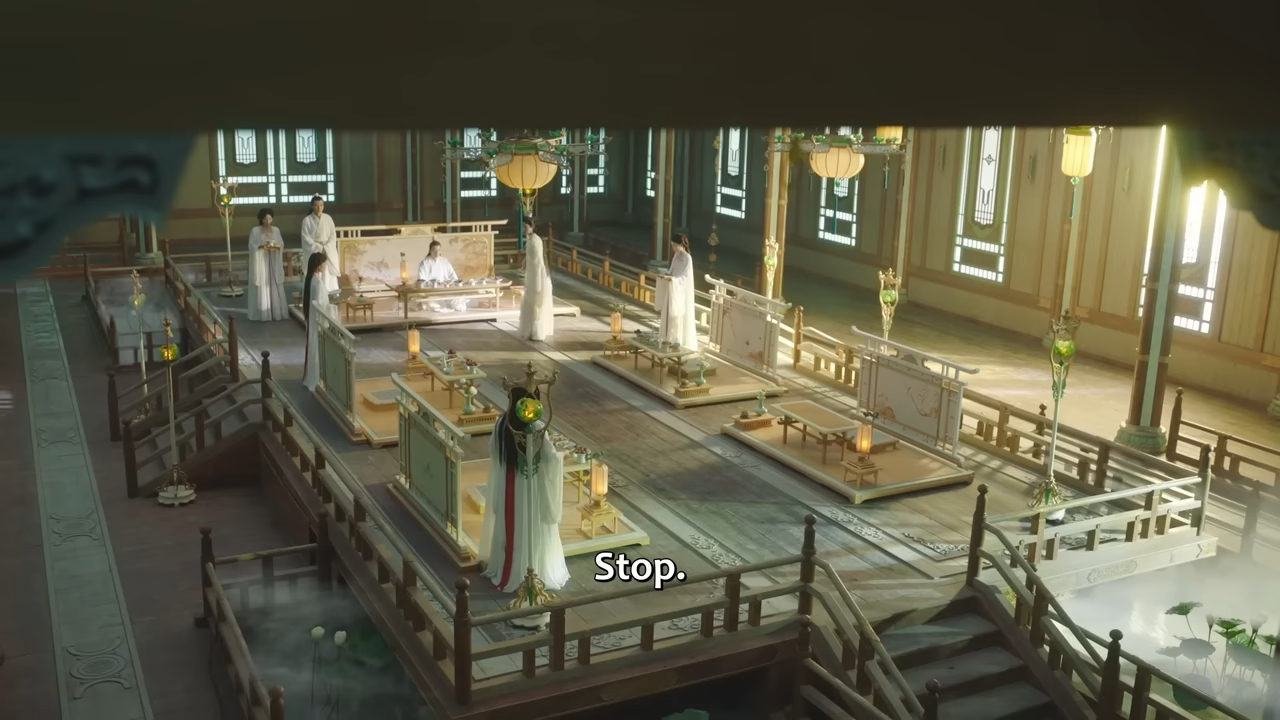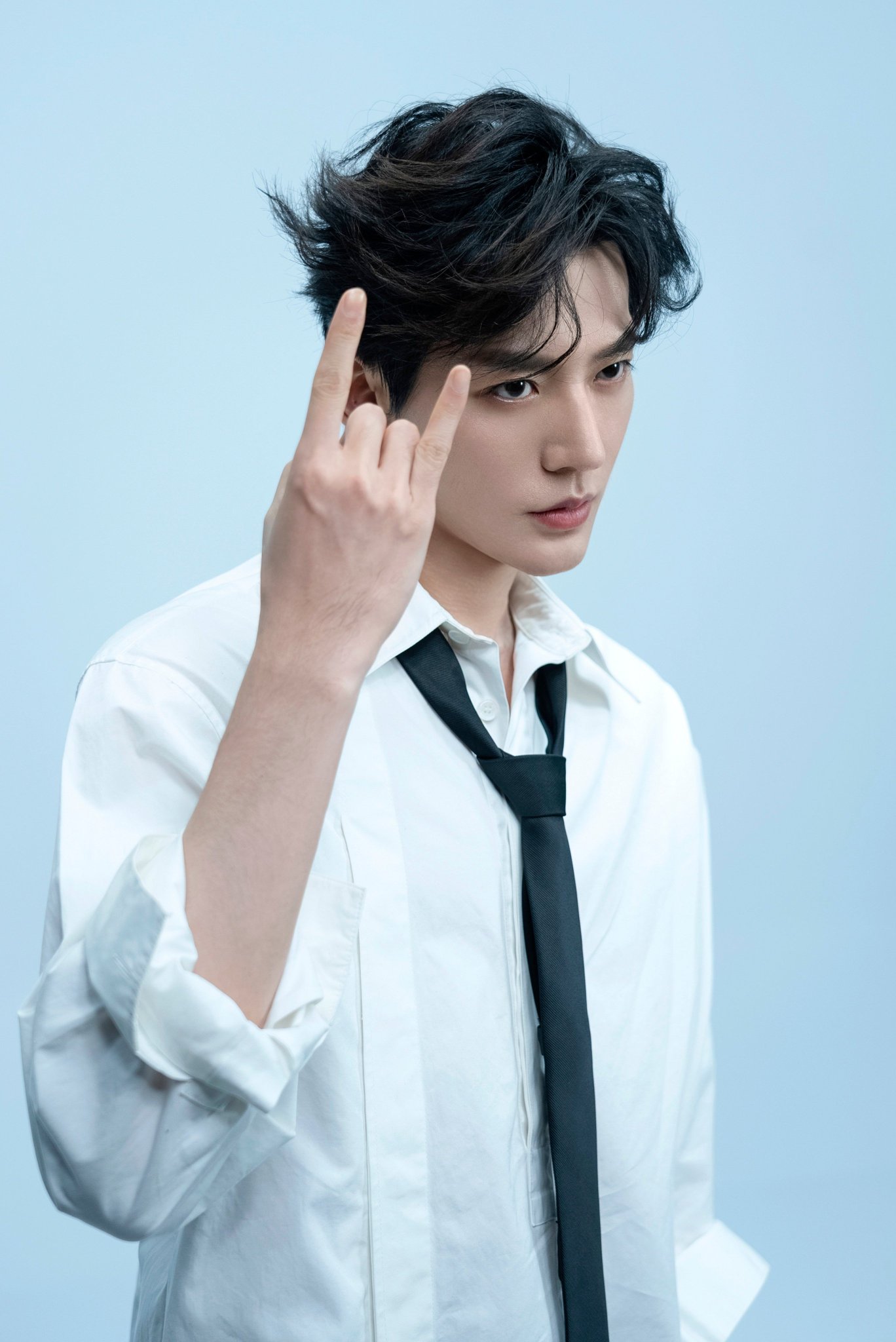Symbolika1:
Hahahaha! Tong Hua words are so visuals! I laughed much to this one! :D
Covered scene in ep.14 :)
-------------------------------------------------------------------------------------------------------------------
While CX inner thoughts are........
Ahahahaha!!! <3 I enjoy her clowning side sooo much! Let's never forget this Xiao Yao's side: her humor!
Symbolika1:
For the beauty, for our eyes: Deng Wei's pics on set today...enjoy <3
O-O - Just ....olalalalalalala! :D <3
ETHERAL AS HELL. DW could teach "how to wear the white wig and looking beautiful , elegant and etheral." Wearing white flowing robes to boot
I swear this is the vision TH had in her head when she had her 1rst thought on how XL should look like.
Even Dong Hua Dijun in eternal love of dreams the pillow book should have looked like that.
peng-peng:
ETHERAL AS HELL. DW could teach "how to wear the white wig and looking beautiful , elegant and etheral." Wearing white flowing robes to boot
I swear this is the vision TH had in her head when she had her 1rst thought on how XL should look like.
Even Dong Hua Dijun in eternal love of dreams the pillow book should have looked like that.


Ahahahaha!!!! :D ! His visual is gold yes yes :D...I burst out laughing ! XD!100 % accurate ...OMG I'm dying :D!.
But Peng...we got his visual for Yeshiqi/Tushan Jing in LYF!, I cannot picture anyone deliver him better than DW! No, no, no...No way....(remember the director praising interview on his elegance ,on his one glance/one catch ability)- so we'll just fully enjoy his carreer, new roles and his multifaced beauty <3
Chapter 9:Winny Aye:
My Analysis Part 1
Literary Analysis with Dialogue Excerpts:
Introduction:
Chapter 9 - Part 1 introduces the enigmatic Grand Emperor, setting the stage for a complex narrative. Through an exploration of key dialogues, we can unravel the intricacies of character relationships, particularly focusing on the interactions between the Grand Emperor, Xiao Liu, Zhuan Xu, and Shi Qi.
Grand Emperor's Aura and Xiao Liu's Provocative Behavior: Excerpt:
"A man in white sat in the middle, his face was neither young nor old, he looked about 30 something, but there were a lot of white hairs in his head and he gave off an aura of weathered sadness."
Analysis: The Grand Emperor's introduction is marked by a description that hints at both physical age and emotional weight. The dialogue here is non-verbal, conveyed through the narrator's observations, setting the tone for the Grand Emperor's enigmatic persona. Xiao Liu's subsequent disruptive behavior during the dinner serves as a dialogue of actions, a silent challenge to the Grand Emperor.
Grand Emperor's Knowledge and Xiao Liu's Identity: Excerpt:
The Grand Emperor asked Xiao Liu, “Who hurt you?”
Xiao Liu smiled and glanced briefly at Zhuan Xu but said nothing. Zhuan Xu turned “It was me. He tried to run away time and time again, so I ordered him punished.”
Analysis: The Grand Emperor's question about Xiao Liu's injury and her subsequent silence speak volumes. The unspoken exchange between them suggests a level of understanding or familiarity. Zhuan Xu's admission of being the one who caused the injury adds tension to the dialogue, as it hints at a troubled history between Zhuan Xu and Xiao Liu.
Zhuan Xu's Realization and Grand Emperor's Calm Response: Excerpt:
“I’m going to ask her. I’m going to ask her who she really is, and why she won’t reunite with me.”
“Halt!”
The Grand Emperor’s icy cold voice caused Zhuan Xu to stop and he looked back in confusion “Doesn’t Master want to know? Xiao Yao is your daughter!”
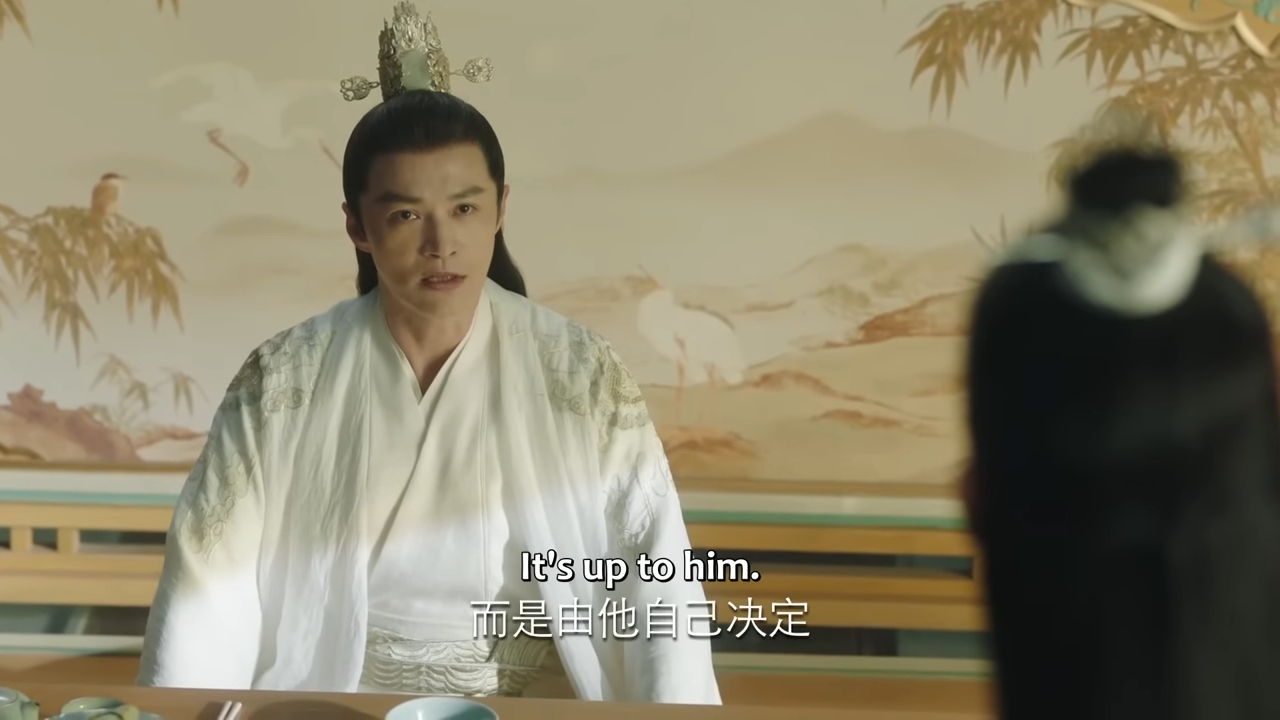
Analysis: Zhuan Xu's emotional outburst and determination to confront Xiao Liu are reflected in his dialogue. The Grand Emperor's response, delivered with an "icy cold" voice, contrasts with Zhuan Xu's turmoil. The revelation that Xiao Yao might be Zhuan Xu's sister adds a layer of complexity to the dialogue, raising questions about Xiao Liu's true identity.
Shi Qi's Supportive Role: Excerpt:
Shi Qi bowed to the Grand Emperor and he said to Shi Qi “You take Xiao Liu back.”
Analysis: The Grand Emperor's directive to Shi Qi is a brief yet significant dialogue. It signifies the Grand Emperor's trust in Shi Qi and establishes Shi Qi's role as a guardian / caretaker for Xiao Liu. The politeness in Shi Qi's bow emphasizes his respect for authority and his willingness to follow orders.
Speculations and Unveiling Mysteries: Excerpt:
“Master, who is he?”
The Grand Emperor asked back “Who do you think he is?”
Analysis: Zhuan Xu's direct inquiry and the Grand Emperor's counter-question create a dialogue that prompts speculation. The exchange invites readers to participate in the mystery, encouraging them to form their own hypotheses about the identities and relationships of the characters.
Conclusion:
Through a careful analysis of dialogues in Chapter 9 - Part 1, we gain insights into the characters' emotions, relationships, and the overarching mysteries driving the narrative. Dialogues serve as a powerful tool in conveying tensions and revelations.
-------------------------------------------------------------------------------------------------------------------
Symbolism of Xiao Liu's Behavior:
Xiao Liu's disruptive and uncouth behavior during the dinner carries symbolic weight. Her "loud uncouth noises" and messy eating style serve as a rebellion against the formality of the imperial hall. This can be seen as a reflection of Xiao Liu's resistance to societal norms and expectations, possibly stemming from her mysterious background and experiences.
Grand Emperor's Stoicism:
The Grand Emperor's calm demeanor in the face of Xiao Liu's provocative actions raises questions about his emotional state and self-control. His ability to maintain composure hints at a deep well of experience and wisdom. The "aura of weathered sadness" around him suggests a complex past, adding layers to his character.
Zhuan Xu's Emotional Turmoil:
Zhuan Xu's emotional journey in this scene is palpable. From the initial shock of recognizing Xiao Liu's potential identity to his desperate desire for answers, Zhuan Xu undergoes a tumultuous emotional experience. His determination to confront Xiao Liu and seek the truth reveals the depth of his emotional investment in her.
Shi Qi's Role as a Mediator:
Shi Qi's role as the intermediary between Xiao Liu and the Grand Emperor is noteworthy. His calm and composed demeanor during the dinner, despite Xiao Liu's behavior, showcases his ability to navigate complex situations. This role positions Shi Qi as a bridge between the mysterious world of Xiao Liu and the imperial court.
Foreshadowing and Mystery:
The Grand Emperor's enigmatic responses and the lingering mysteries surrounding Xiao Liu's true identity contribute to the overall sense of anticipation and foreshadowing. The scene sets the stage for revelations and unveils a web of secrets that will likely shape the narrative's trajectory.
Contrast in Dining Etiquette:
The stark contrast between Xiao Liu's eating habits and the refined manners of the imperial hall's occupants serves as a visual metaphor. This dichotomy may represent Xiao Liu's outsider status and her reluctance to conform to the expectations of the elite. It also underscores the theme of societal norms versus individual authenticity.
Themes of Identity and Choice:
The central theme of identity and the power of personal choice reverberates throughout the scene. The Grand Emperor's insistence that Xiao Liu must decide her own identity and destiny introduces a philosophical layer to the narrative. It raises questions about agency, self-discovery, and the consequences of one's choices.
Intricacies of Parental Relationships:
The scene delves into the complexities of familial relationships, particularly between Zhuan Xu and Xiao Liu. The revelation of Xiao Liu potentially being Zhuan Xu's daughter adds an emotional dimension. The Grand Emperor's insistence on allowing Xiao Liu to decide her familial ties emphasizes the theme of choice even within familial bonds.
Overall Atmosphere:
The tone of the scene oscillates between tension, mystery, and a touch of melancholy. The silent power play, the weight of unspoken truths, and the unresolved emotions contribute to a rich and multifaceted atmosphere.
--------------------------------------------------------------------------------------------------------------------
Bonus: (ep.14) CX "welcomed moment" by Xiao Liu and Yeshiqi - both expressions are gold:
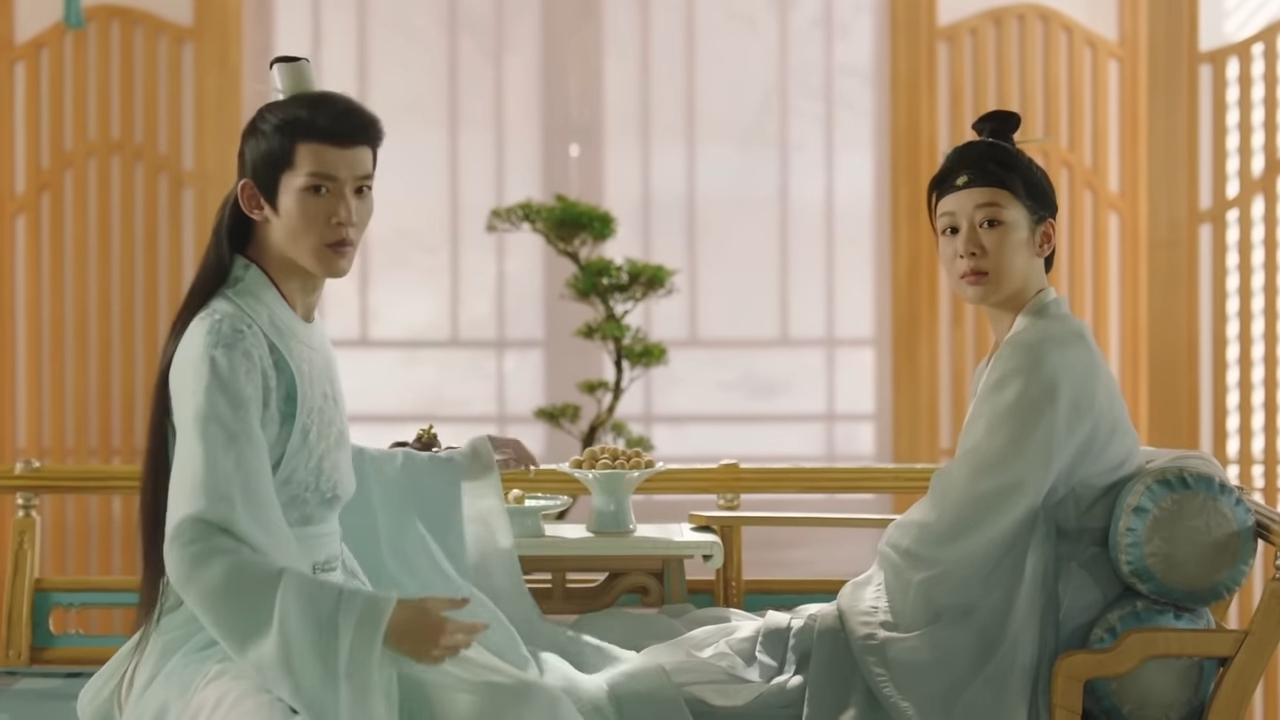
****(draft for now) to be continued... :)
Symbolika1:
:D ! His visual is gold yes yes :D...I burst out laughing ! XD!100 % accurate ...OMG I'm dying :D!.
But Peng...we got his visual for Yeshiqi/Tushan Jing in LYF!, I cannot picture anyone deliver him better than DW! No, no, no...No way....(remember the director praising interview on his elegance ,on his one glance/one catch ability)- so we'll just fully enjoy his carreer, new roles and his multifaced beauty <3
Deng Wei is perfect Jing. I am sure he had sold his soul for the character. He has innocent sweet aura with smart, elegant and very charming, he is calm and gentle but also very passionate. He values love the most, and very direct with it.
I find Deng Wei performance very detailed.
But you are right, we will see him different roles.
He indeed is multiface beauty
peng-peng:
ETHERAL AS HELL. DW could teach "how to wear the white wig and looking beautiful , elegant and etheral." Wearing white flowing robes to boot
I swear this is the vision TH had in her head when she had her 1rst thought on how XL should look like.
Even Dong Hua Dijun in eternal love of dreams the pillow book should have looked like that.
Definetly elegant in white..
Contrast in Dining Etiquette:Symbolika1:
The stark contrast between Xiao Liu's eating habits and the refined manners of the imperial hall's occupants serves as a visual metaphor. This dichotomy may represent Xiao Liu's outsider status and her reluctance to conform to the expectations of the elite. It also underscores the theme of societal norms versus individual authenticity.
The theme of identity and the power of personal choice has been a central focus in various philosophical traditions, with thinkers exploring the nature of selfhood, free will, and the implications of our choices. While it's challenging to pinpoint a single philosopher or set of words that encapsulate this theme, several notable figures and their philosophical perspectives contribute to our understanding of identity and choice.
Exemples:
Existentialism - Jean-Paul Sartre:
Sartre, a prominent french existentialist philosopher, argued that existence precedes essence, emphasizing human freedom and the responsibility that comes with it. His famous phrase "existence precedes essence" suggests that individuals are first born into the world without a predetermined essence or identity. Instead, they construct their identities through their choices and actions.
Sartre's notion of "bad faith" explores how individuals may avoid taking responsibility for their freedom by conforming to societal expectations and not fully embracing their capacity to choose. In the context of Xiao Liu's situation, the Grand Emperor's insistence on her deciding her own identity aligns with Sartrean existentialist principles.
Personal Identity - John Locke:
John Locke, a philosopher of the Enlightenment, discussed personal identity and consciousness. According to Locke, personal identity is tied to consciousness and memory. Individuals are the same person over time if they retain memories of past experiences.
Applying Locke's ideas to the scene, Xiao Liu's potential struggle with her identity aligns with Locke's emphasis on memory as a key component of personal identity. The Grand Emperor's encouragement for Xiao Liu to decide her identity recognizes the role of memory and self-awareness in shaping one's sense of self.
Determinism and Free Will - Friedrich Nietzsche:
Nietzsche's exploration of eternal recurrence and the will to power delves into the concepts of determinism and free will. While he did not provide a straightforward solution, his writings invite contemplation on the idea of embracing one's existence and choices, even in the face of an eternal return.
Xiao Liu's predicament, coupled with the Grand Emperor's insistence on her agency, echoes Nietzschean themes of embracing the weight of one's choices, knowing that they contribute to the continual shaping of one's identity.
Ethics of Care - Nel Noddings:
Nel Noddings, a contemporary ethicist, discusses the ethics of care and relational ethics. Her work emphasizes the importance of relationships and caring for others in moral decision-making. Applying this to the scene, the Grand Emperor's approach may align with a caring perspective that allows Xiao Liu the freedom to determine her identity.
Noddings' philosophy introduces a softer, more compassionate understanding of moral agency and choice, suggesting that the relationships between individuals play a crucial role in shaping ethical decisions.
While these philosophers may not have directly addressed the specific scenario in the novel, their ideas provide a philosophical backdrop to the themes of identity and choice presented in Chapter 9 - Part 1. The narrative invites readers to contemplate the profound philosophical questions embedded in the characters' struggles and decisions.
------------------------------------------------------------------------------------------------------------------------------
So, to wich philosophy could Xiao Liu and Grand Emperor -fit mostly?...In my opinion it's Jean Paul Sartre:
- Xiao Liu's character, with her journey of self-discovery and the emphasis on personal choice, aligns closely with existentialist themes. In particular, her situation resonates with the existential philosophy of Jean-Paul Sartre. Sartre's ideas, such as "existence precedes essence" and the importance of individual freedom and responsibility, provide a philosophical lens through which Xiao Liu's character can be viewed.
- Existentialism - Jean-Paul Sartre:
Xiao Liu: Her quest to define her identity, the freedom to make choices, and the existential angst she experiences in confronting her past align with Sartrean existentialist principles. Xiao Liu embodies the existential hero who must grapple with the responsibility of shaping her own identity through her choices.
Grand Emperor: The Grand Emperor's approach to Xiao Liu's identity and the emphasis on her making her own choices reflects a Sartrean recognition of individual freedom. By allowing Xiao Liu the agency to determine her identity, the Grand Emperor adopts a perspective that resonates with existentialist themes of personal responsibility.
While Xiao Liu's character leans towards existentialist notions, the Grand Emperor's role aligns with the mentor figure who acknowledges and respects the individual's freedom to shape their identity.

Jean Paul Sartre and his wife, Simone de Beauvoir
Further : https://fr.wikipedia.org/wiki/Jean-Paul_Sartre + Book Quote: 
Shi Qi's Role as a Mediator:Symbolika1:
Shi Qi's role as the intermediary between Xiao Liu and the Grand Emperor is noteworthy. His calm and composed demeanor during the dinner, despite Xiao Liu's behavior, showcases his ability to navigate complex situations. This role positions Shi Qi as a bridge between the mysterious world of Xiao Liu and the imperial court.
Tushan Jing/Yeshiqi as mediator, and connection between the past and the present, as well as a facilitator for Xiao Liu's journey of self-discovery. He acts as a liaison, enabling communication between Xiao Liu and the Grand Emperor.
Extract: -" Shi Qi bowed to the Grand Emperor and he said to Shi Qi “You take Xiao Liu back.”

Also: His calm and composed presence supports Xiao Liu during her encounters with the Grand Emperor. His assistance and understanding contribute to Xiao Liu's sense of security and trust. As a result, Shi Qi becomes a crucial ally in Xiao Liu's quest to understand her true identity -allowing Xiao Liu to navigate the complexities of her past and present :).
it wasn’t lost and was tucked into his robe.Winny Aye:
Part 2, Thank you Winny <3
Summary of this second part: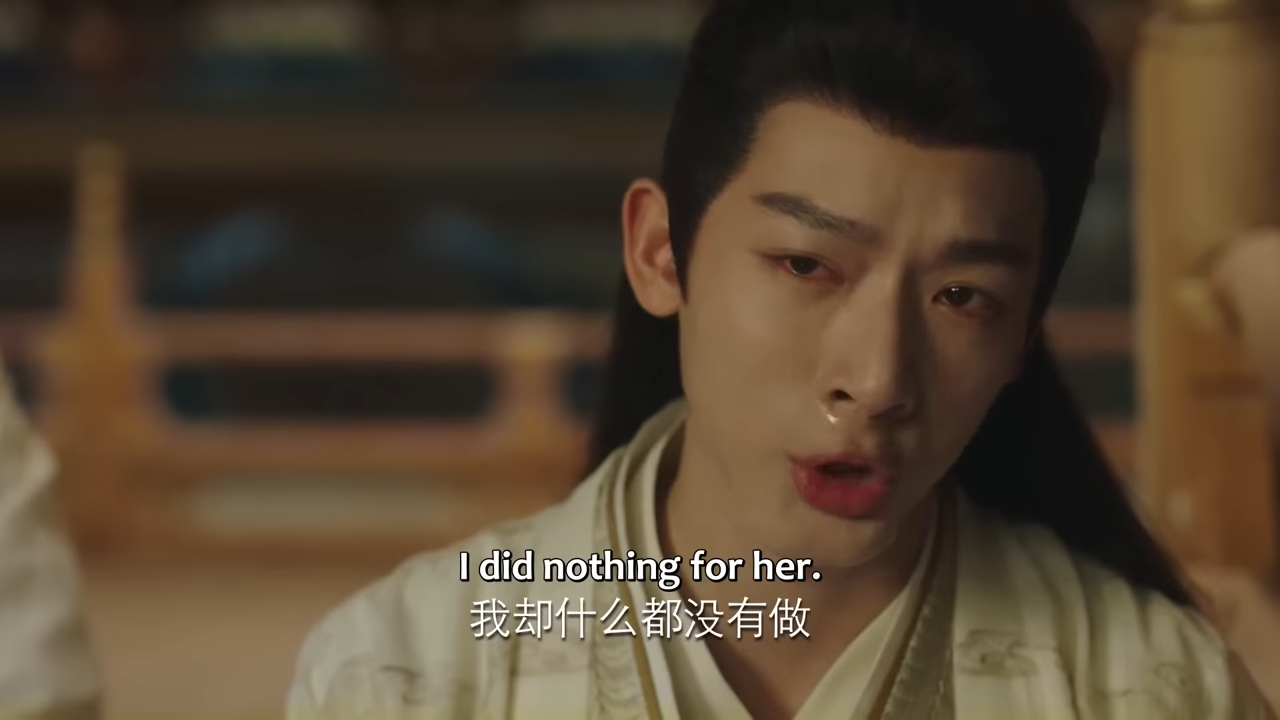
Zhuan Xu's Realization and Reflection:
Zhuan Xu's journey in this chapter is marked by profound realizations and self-reflection. His initial disbelief and shock upon discovering Xiao Liu's true identity as Xiao Yao, his long-lost sister, opens a floodgate of memories. The narrative beautifully captures the complexity of Zhuan Xu's emotions as he grapples with the stark contrast between his past actions and his newfound awareness. His recognition of Xiao Liu's sacrifices and genuine care for him unveils layers of guilt and remorse.
Philosophical Connection: This part of the narrative aligns with philosophical themes related to self-awareness, redemption, and the consequences of one's actions. It echoes the idea that true growth comes from acknowledging one's mistakes and learning from them.
Shi Qi's Protective Role:
Shi Qi emerges as a silent yet potent guardian throughout this chapter. His actions, from carrying Xiao Liu to feeding her fruits, highlight a consistent theme of protection and care. The subtle yet powerful attack on Zhuan Xu when he perceives a threat to Xiao Liu emphasizes Shi Qi's unwavering commitment.
Symbolic Significance: Shi Qi's protective role symbolizes stability and support. In a chapter marked by emotional turbulence, Shi Qi becomes a steady force, reinforcing the novel's exploration of trust and reliability.
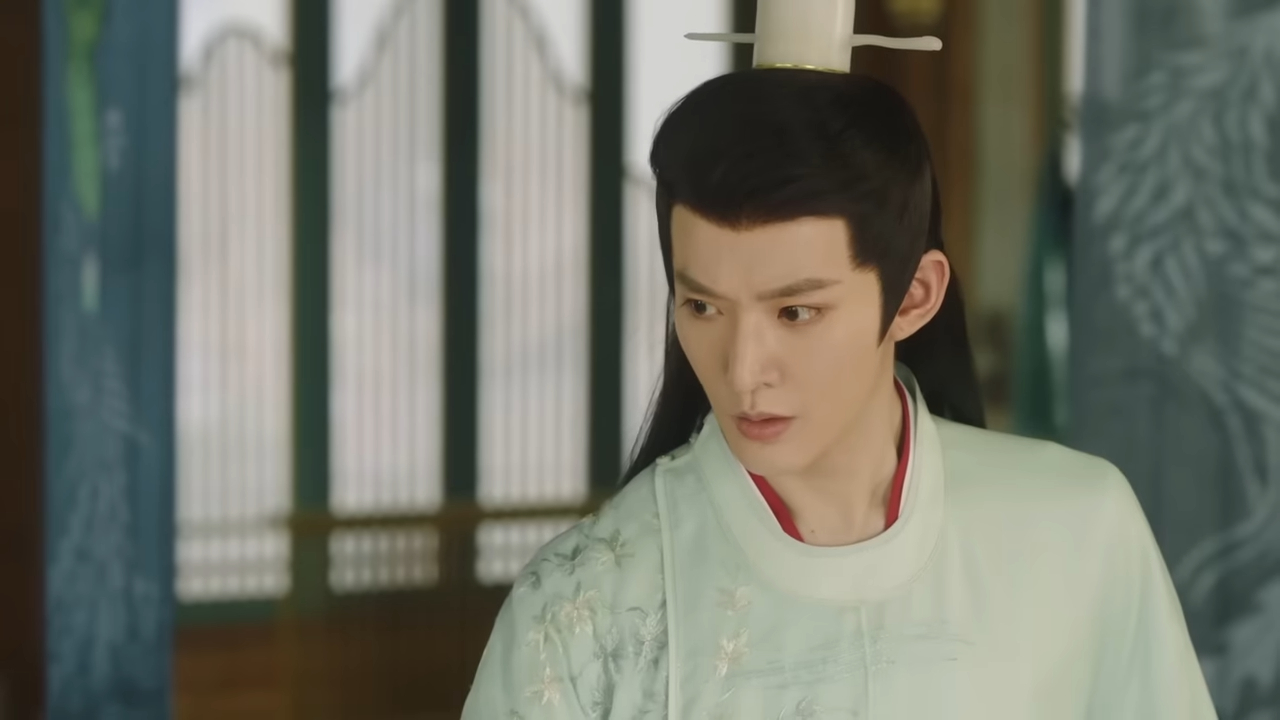
Zhuan Xu's Unspoken Apology:
Zhuan Xu's interaction with Xiao Liu showcases a profound yet unspoken apology. His tenderness toward her injured legs and the genuine concern for her well-being serve as a silent acknowledgment of the pain he caused. The blood from Zhuan Xu's self-inflicted wound becomes a symbolic gesture, reflecting the emotional wounds he inflicted upon Xiao Liu.
Literary Device: This part of the narrative employs poignant imagery and symbolism to convey complex emotions. The blood connecting Zhuan Xu and Xiao Liu's legs creates a visual metaphor for shared pain and a tentative bridge toward reconciliation.
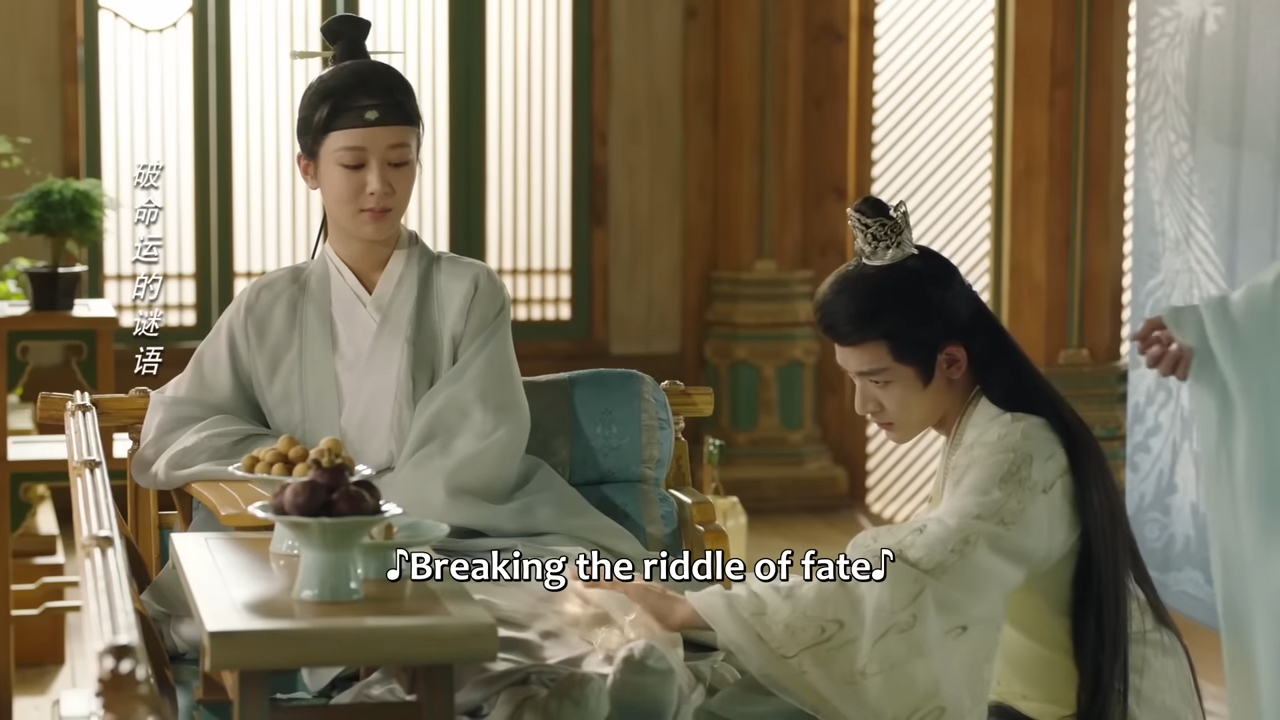
Xiao Liu's Emotional Resilience:
Xiao Liu's response to Zhuan Xu's tenderness speaks volumes about her emotional resilience. Despite the hardships she endured and Zhuan Xu's past mistreatment, her ability to close her eyes and calmly respond to Zhuan Xu's question about pain suggests a level of forgiveness and acceptance.
Character Development: Xiao Liu's character undergoes subtle yet significant development. Her past, filled with bloodshed and deception, contrasts with her present vulnerability. The juxtaposition highlights her capacity for growth and adaptation.
Foreshadowing: The mention of the missing red phoenix flower and the absence of Xiao Liu's past sanctuary hints at unresolved mysteries and foreshadows future challenges
-------------------------------------------------------------------------------------------------------------------------------
Blood Connection: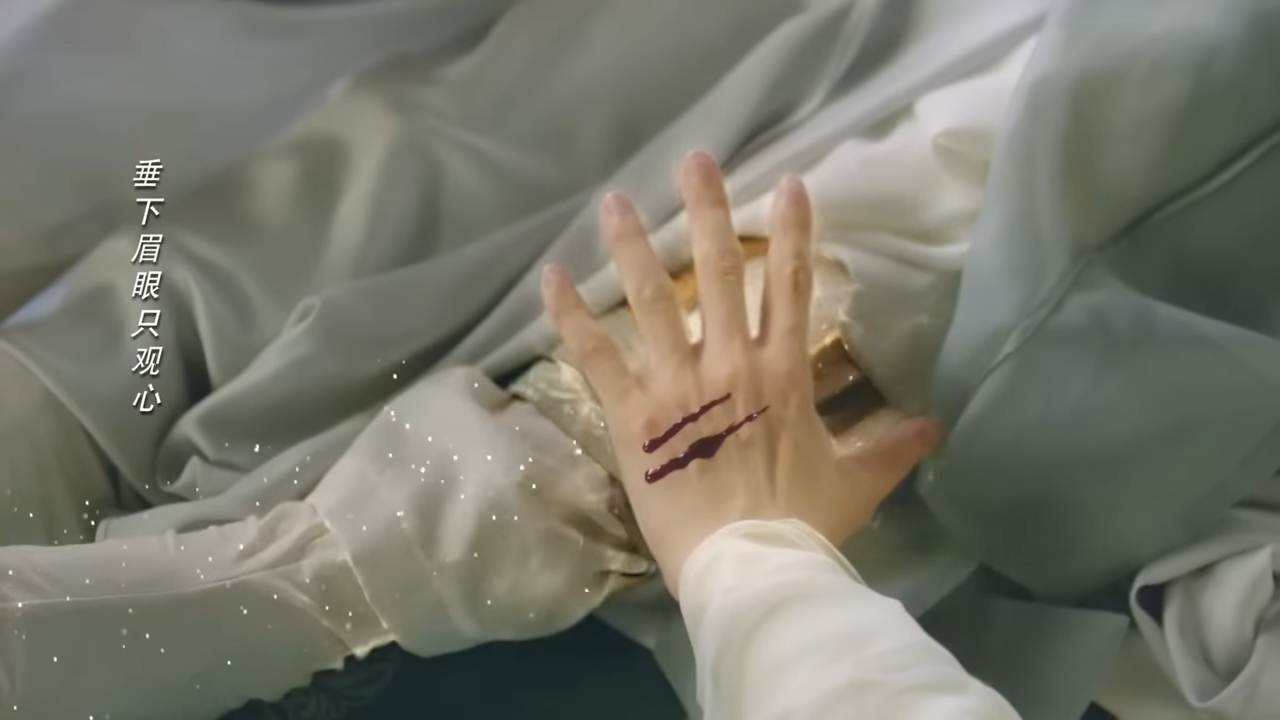
The scene where Zhuan Xu allows Shi Qi's attack to pierce his hand creates a symbolic link between Zhuan Xu and Xiao Liu. This shared blood becomes a metaphor for their intertwined destinies and the emotional wounds that connect them. It symbolizes a link between past actions and a tentative step towards reconciliation.
Night and Flowers:
The night setting, with petals swirling in the air, adds an atmospheric touch to Zhuan Xu's introspective walk. The absence of the red phoenix flower, a symbol of Xiao Liu's past sanctuary, reinforces the idea of the lost innocence and an unattainable ideal he want to reach.
Character Dynamics:
Zhuan Xu's Internal Conflict: The internal turmoil within Zhuan Xu is palpable. His inability to express the multitude of emotions reflects a character deeply scarred by his past actions. The contrast between the present Zhuan Xu and the boy pushing Xiao Liu on the swing highlights the transformative impact of the years and the burdens he carries. A symbol to his internal swing.
Xiao Liu's Emotional Release: Xiao Liu's tears, unleashed only after Zhuan Xu's departure, serve as a cathartic moment. Her emotional vulnerability, hidden behind a façade of strength, exposes the toll her tumultuous life has taken on her. The act of burying her face in Shi Qi's chest symbolizes a rare moment of seeking comfort and solace.
Themes of Redemption and Forgiveness:
Zhuan Xu's Unspoken Apology: Zhuan Xu's actions, from tending to Xiao Liu's legs to allowing Shi Qi's attack, can be seen as an unspoken apology. The motif of physical pain, both self-inflicted and directed take a form of redemption, a way to deal with the emotional gaps created by past mistakes.
Xiao Liu's Forgiveness: Xiao Liu's stoic response to Zhuan Xu's question about pain implies a willingness to forgive. It hints at her understanding of Zhuan Xu's struggles and her capacity for empathy.
--------------------------------------------------------------------------------------------------------------------------------
Emotional Resonance and CX/TSJ Contrasting Roles in Xiao Liu's Life:
Zhuan Xu's Internal Turmoil:
- Haunted by Past Actions: Zhuan Xu's character is marked by internal conflicts stemming from his past actions. The weight of decisions made in the previous chapters, such as ordering Xiao Liu's torture for exemple, lingers heavily on his conscience. This turmoil impedes his ability to openly express emotions.
- Struggle with Authenticity: Having worn a metaphorical mask for an extended period, Zhuan Xu grapples with authenticity. His years of exile and manipulation have shaped him into a person who, at times, struggles to connect genuinely with others. This internal struggle is evident in his interactions with Xiao Liu.
Extract: - "he had worn his mask for too long and no longer knew how to feel genuine joy and genuine pain. He learned to manipulate others but forgot to act with sincerity. He learned to use all sorts of strategy to achieve his goals but forgot how to converse candidly.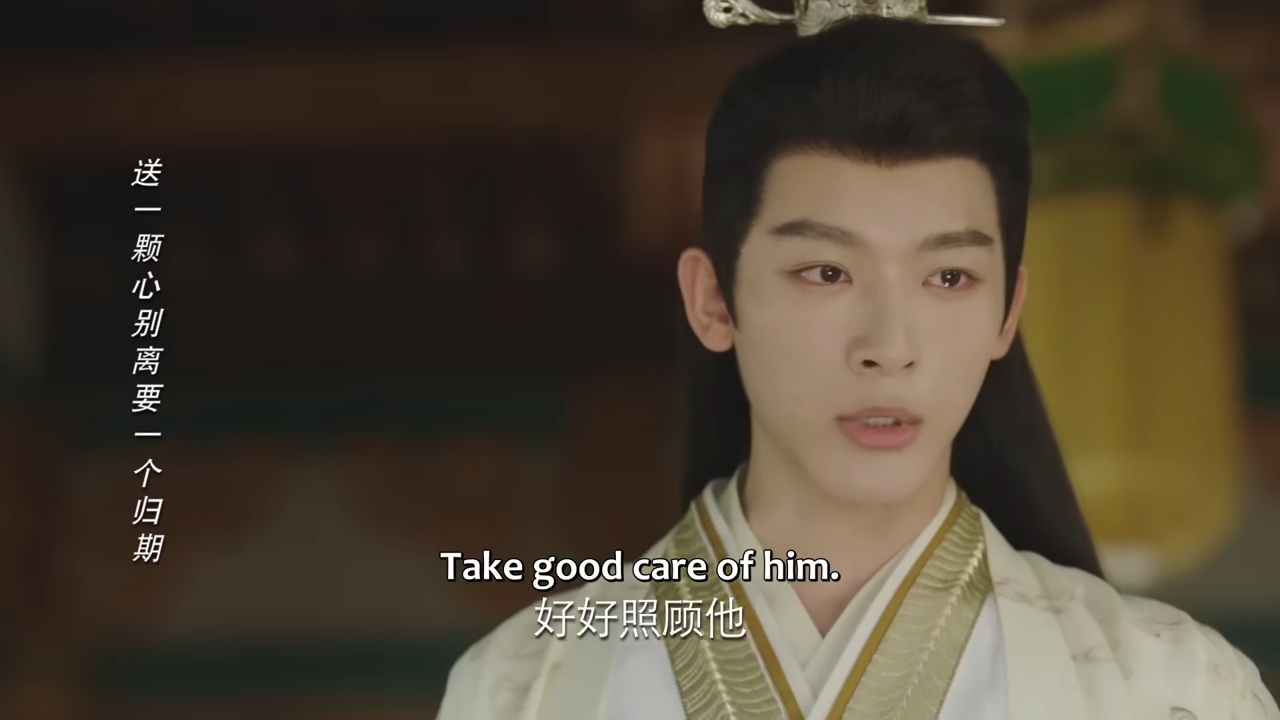
Zhuan Xu stood up and said to Shi Qi “Take good care of her.”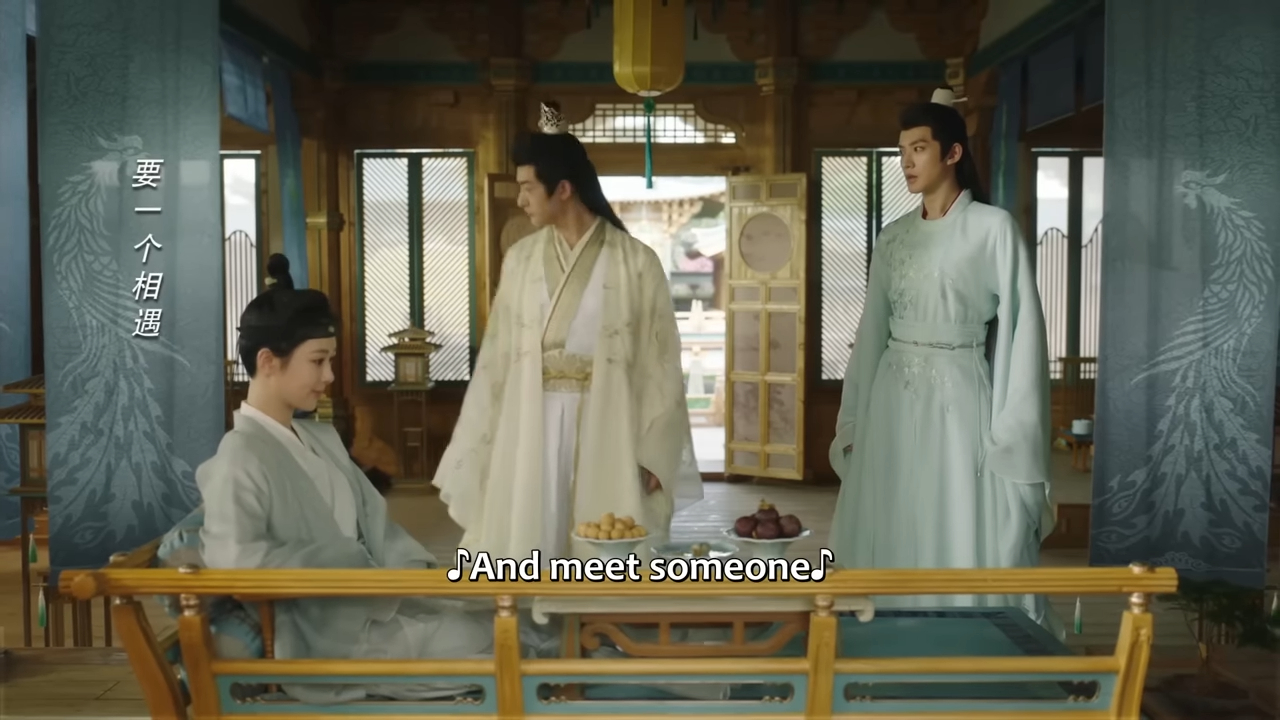
2 .Shi Qi's Present and Tangible Comfort:
- Physical and Emotional Care: Shi Qi, on the other hand, represents a stark contrast.
His actions are immediate, tangible, and rooted in the present. From peeling fruits to offering a comforting embrace, Shi Qi provides both physical and emotional care to Xiao Liu.
****This contrast highlights the dichotomy between dwelling on past mistakes and addressing present needs.
- Steadfast Support: Unlike Zhuan Xu's internal conflicts, Shi Qi's support is steadfast and unwavering. His role extends beyond the complexities of political intrigue and historical burdens. In caring for Xiao Liu's immediate well-being, Shi Qi embodies a sense of reliability and constancy in the midst of present chaos.
=> Implications for Xiao Liu's Healing:
Zhuan Xu's in blood apology:
- Unspoken Apology: Zhuan Xu's actions, such as tending to Xiao Liu's legs and allowing Shi Qi's attack, can be interpreted as an unspoken apology. The physical pain becomes a metaphorical way for Zhuan Xu to convey remorse and seek redemption for past transgressions.
Shi Qi as a Source of Comfort:
- Healing in the Present: Shi Qi's role in providing immediate comfort aligns with the theme of healing in the present moment. His gestures go beyond CX symbolic apologies, he is fully focusing on Xiao Liu's current needs. This dynamic introduces the idea that, amidst Zhuan Xu's internal struggles, Shi Qi serves as a tangible source of comfort and stability.
=>Broader Themes of Redemption and Compassion:
Redemption Through Actions:
- Actions Speak Louder:
The contrast between Zhuan Xu's internal turmoil and Shi Qi's outward gestures underscores the narrative's exploration of redemption. The narrative suggests that redemption is not solely achieved through introspection but also through tangible actions that address the consequences of one's past.
2. Compassion as a Healing Force:
° Shi Qi's Compassion:
Shi Qi's compassion becomes a potent force in Xiao Liu's journey. His ability to offer care and support exemplifies the transformative power of compassion in healing emotional wounds. This theme positions compassion as a vital element in the characters' collective quest for redemption and understanding in the novel.
compassionSymbolika1:
.... compassion is a significant aspect of both Shi Qi's and Xiao Liu's characters. Let's explore how compassion manifests in each of them:
A. Shi Qi's Compassion:
- Protectiveness and Care: Throughout the narrative, Shi Qi consistently displays a protective and caring attitude towards Xiao Liu. This protective instinct goes beyond duty and reflects a genuine concern for her well-being.
- Immediate Response to Threats: When Zhuan Xu's hand approaches Xiao Liu's injured leg, Shi Qi's swift response to defend her showcases not only his physical strength but also his emotional investment in safeguarding her from harm.
- Gentle Gestures: Shi Qi's actions, such as peeling and offering fruits, signify a form of tenderness and thoughtfulness. These gestures go beyond mere practical assistance, revealing an emotional connection and a desire to provide comfort.
B. Xiao Liu's Compassion:
- Saving Zhuan Xu: Despite Zhuan Xu ordering her torture, Xiao Liu uses her body to shield him from harm when Nine-lives Xiang Liu is chasing him. This self-sacrificial act reflects a compassion that transcends personal grievances.
- Emotional Understanding: Xiao Liu's ability to understand Zhuan Xu's internal struggles and respond to them with a stoic demeanor implies a level of emotional intelligence and compassion. Her willingness to forgive, as indicated by her calm response to Zhuan Xu's question about pain, further underscores this quality.
- Healing Presence: Xiao Liu becomes a source of healing for Zhuan Xu, not only physically but also emotionally. Her past experiences, marked by bloodshed and betrayal, make her a unique character capable of extending compassion even in challenging circumstances.
A+B=Shared Compassion:
- Mutual Understanding: Both Shi Qi and Xiao Liu share a sense of understanding and compassion for each other's experiences. Shi Qi's protective nature aligns with Xiao Liu's need for stability and care, creating a symbiotic relationship built on empathy.
- Journey Towards Redemption: The presence of compassion in these characters contributes to the broader theme of redemption. It suggests that, despite past conflicts and betrayals, the capacity for compassion can serve as a catalyst for personal growth and deep mutual understanding.This point is strengthening their emotional connection.
This common compationate character trait, made me want to explore some more common traits between Xiao Liu/Xiao Yao and Yeshiqi/Tushan Jing:
------------------------------------------------------------------------------------------------------------------
Resilience:
- Both characters exhibit remarkable resilience in the face of adversity. Shi Qi's endurance of the torture inflicted by his brother and Xiao Liu's survival through a life filled with equally challenges highlight their inner strength and determination.
- Def.Resilience is the ability to withstand adversity and bounce back from difficult life events. Being resilient does not mean a person doesn't experience stress, emotional upheaval, and suffering. Resilience involves the ability to work through emotional pain and suffering.
- How do you show resilience?Resilient people have a positive image of the future. That is, they maintain a positive outlook, and envision brighter days ahead. Resilient people have solid goals, and a desire to achieve those goals. Resilient people are empathetic and compassionate, however, they don't waste time worrying what others think of them.
Resilient people never think of themselves as victims – they focus their time and energy on changing the things that they have control over.
Resilient is to have the courage to go after our dreams, despite the very real risk that we'll fail in some way or another. Being resilient means that when we do fail, we bounce back, we have the strength to learn the lessons we need to learn, and we can move on to bigger and better things.
Empathy:
- Beyond compassion, both Shi Qi and Xiao Liu demonstrate empathy. They understand each other's pain and struggles, creating a foundation for emotional connection. This shared empathy contributes to the depth of their relationship.
- Empathy Fosters Connection :it is defined as “the feeling that you understand and share another person’s experiences and emotions” or “the ability to share someone else’s feelings.” It is looking at things from another person’s perspective and attempting to understand why they feel the way they do.
- Empathy is not easy. It requires a tremendous amount of vulnerability to listen without judgment and see yourself in another person’s struggle. Empathy can be uncomfortable especially when you are supporting someone in a dark time.
- By expressing empathy to your loved ones, you are inviting them into your inner world. When they see that you have struggles of your own, it makes them feel connected. This connection allows them to trust you and share what they are feeling. Empathy creates connection and understanding.
- https://www.psychmc.com/blogs/empathy-vs-sympathy
Courage:
- Whether facing physical torture or confronting a concealed past, Shi Qi and Xiao Liu display courage in challenging situations. Their ability to confront difficulties head-on reflects a shared trait that contributes to their growth as characters.
- From Old French corage (French: courage), from Latin cor (“heart”). Distantly related to cardiac (“of the heart”), which is from Greek, but from the same Proto-Indo-European root.
- The attitude of facing and dealing with anything recognized as dangerous, difficult, or painful, instead of withdrawing from it; quality of being fearless or brave.
- https://www.yourdictionary.com/courage

Trustworthiness:
- Trust is an essential element in their relationship. Despite the complexities of their individual histories, they demonstrate trustworthiness in their interactions. This mutual trust becomes a crucial factor in navigating the uncertainties of their intertwined destinies.
- What are the five elements of trustworthiness?Along with a general willingness to risk vulnerability, five faces of trust emerged: benevolence, reliability, competence, honesty, and openness. This conceptual formulation of faculty trust was then subjected to empirical test, which supported the theoretical underpinnings of the construct.
- What is the difference between trust and trustworthy? Trust is the near-term perception or leap of faith on which to base a decision. Trustworthiness is earned through an active pattern of behavior over a period of time.
Protectiveness:
- Shi Qi's protective instincts, evident in his actions towards Xiao Liu, align with her own protective nature. They share a desire to shield each other from harm, emphasizing a mutual commitment to one another's well-being.
- Protecting from outer dangers, inner threats, and even accidents can show love. From the time a child is born, adults are aware that protecting is an essential expression of love.
6. Adaptability:
- Both characters exhibit adaptability in various circumstances. Whether dealing with external threats or navigating complex relationships, Shi Qi and Xiao Liu showcase the ability to adapt and evolve, contributing to their resilience in a changing world.

7.Altruism:
- Altruistic tendencies are apparent in both Shi Qi and Xiao Liu's actions. Their willingness to sacrifice for the well-being of others, as seen in Shi Qi saving Xiao Liu's life or Xiao Liu enduring hardships for the greater good, underscores their altruistic nature.
8. Complexity and Layers:
- Both characters are multifaceted, with layers of complexity that make them intriguing. This depth adds dimension to their personalities, making them more relatable and engaging for the audience.
9. Compassion :
Shared Compassion:
- Mutual Understanding: Both Shi Qi and Xiao Liu share a sense of understanding and compassion for each other's experiences. Shi Qi's protective nature aligns with Xiao Liu's need for stability and care, creating a symbiotic relationship built on empathy.
- Journey Towards Redemption: The presence of compassion in these characters contributes to the broader theme of redemption. It suggests that, despite past conflicts and betrayals, the capacity for compassion can serve as a catalyst for personal growth and deep mutual understanding.This point is strengthening their emotional connection. Compassion extend kindness and forgiveness toward others, even those who have intentionally transgressed.
- Compassion “In the classical teachings of the Buddhist tradition compassion is defined as the heart that trembles in the face of suffering. At times, compassion is translated as the heart that can tremble in the face of suffering. It is aspired to as the noblest quality of the human heart, the motivation underlying all meditative paths of healing and liberation.
- https://ccare.stanford.edu/research/wiki/compassion-definitions/compassion/
- “Compassion comes into the English language by way of the Latin root “passio”, which means to suffer, paired with the Latin prefix “com”, meaning together – to suffer together.
Side note- nobody is 100% this, 100% that. But there are some traits characteristics that as they are : and recurent and prime expressions of themselves, apply, not as general, but as usual characteristics. Referential. (draft - it's late to be continued:) )
Recent Discussions
-
Last watched documentary series or movie?5 minutes ago - Moonlight
-
Top 5 Favorite Western Movies9 minutes ago - Anne613
-
BL Drama Lovers Club29 minutes ago - RiqueXinw
-
Xiang Liu and Xiao Yao’s Story and Romance1 hour ago - blabla100
-
Historical Dramas Club1 hour ago - Ari
-
What is your favorite American show?3 hours ago - Anne613
-
Can anyone help me name this Movie?3 hours ago - SandyNZ
Hottest Discussions
-
♥️Count to 7000000♥️12 minutes ago
-
***Count to 100,000***45 minutes ago
-
Change 1 letter to make a new word #221 minutes ago
-
10 dramas/movies with ____? #410 minutes ago
-
The ALPHABET Game [drama /movie version]15 minutes ago
-
♡Last letter of a country / town game♡20 minutes ago
-
Soundtrack Lovers Club6 hours ago

